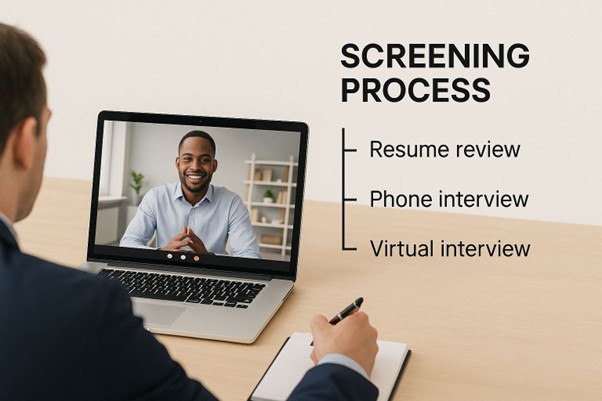Finding Talent with a Recruitment Agency I
In today’s cut-throat talent market, finding the right people isn’t just an HR task—it’s a strategic imperative. This is where a recruitment agency steps in, acting less like a vendor and more like a vital partner for growth, helping you find the perfect candidates faster and more effectively than you ever could alone.
Why Your Next Hire Should Come from a Recruitment Agency
Hiring on your own often feels like you’re fishing with a single rod in a vast ocean, just hoping the right one bites. But partnering with a recruitment agency? That’s like deploying an entire fleet of specialised vessels using advanced sonar, targeting exactly where the best talent is swimming. They don’t just post a job and wait; they actively hunt for professionals who are the right fit for your company’s unique needs and culture.
This kind of strategic partnership is fast becoming the norm, not the exception. The Indian recruitment market itself tells this story loud and clear. The market was pegged at around ₹1.5 lakh crore in FY 2022 and is on track to hit approximately ₹4 lakh crore by 2030, growing at a compound annual rate of 13.2%. This surge is fuelled by the intense demand for talent in major hubs like Bengaluru and Mumbai, proving that more and more companies are leaning on agency expertise.
Navigating Complex Hiring Challenges
A top-tier recruitment agency brings far more to the table than just a list of names. They provide deep market intelligence, helping you get a real sense of salary benchmarks and what your competitors are putting on the table. This kind of insight is invaluable, stopping you from making offers that are too low to compete or accidentally overpaying for talent.
Even better, these agencies have extensive, curated networks of pre-vetted professionals. This includes the elusive “passive candidates”—those high-performing individuals who aren’t actively job hunting but are open to the right opportunity if it comes knocking. Gaining access to this hidden talent pool can give your organisation a massive competitive edge.
“A recruitment agency’s true value lies in its ability to connect you with talent you couldn’t find on your own. They expand your reach from the local pond to the entire ocean of potential candidates.”
This guide will break down exactly how these agencies work, the real-world benefits they deliver, and how to choose the right partner for your business. By understanding their process, you can make smarter decisions that don’t just fill roles, but truly strengthen your workforce for the long haul.
We’ll cover everything from the different types of agencies to the best practices for working with them. You can also learn more about how to attract top talent in our comprehensive guide for employers.
A Partnership for Strategic Growth
At the end of the day, bringing a recruitment agency on board is a proactive, strategic move. It frees up your internal HR team to focus on what they do best—employee development, engagement, and retention—instead of getting bogged down in the endless cycle of sourcing and screening.
Think about these key advantages:
- Accelerated Hiring: Agencies have one job: filling your roles. They pour all their resources into doing it quickly, slashing the time-to-hire and reducing the costly impact of having a position sit empty.
- Improved Candidate Quality: With their specialised tools and industry know-how, they’re experts at identifying and attracting a higher calibre of candidate than you might find otherwise.
- Reduced Hiring Risk: Their screening processes are rigorous. This helps weed out potential mismatches early on, minimising the chances—and significant costs—of a bad hire.
How Recruitment Agencies Find Your Ideal Candidate

Turning a job description into a successful hire isn’t just about posting an ad and hoping for the best. It’s a methodical process, and this is where a professional recruitment agency really shines. They follow a structured, multi-stage approach designed to identify, attract, and vet the right talent. The journey from an empty desk to a valued team member is where their expertise becomes crystal clear.
It all kicks off with a deep-dive consultation. Forget a simple meeting; think of this as a diagnostic session. The agency’s first job is to get under the skin of the role, understanding the team dynamics, company culture, and the real-world problems this new hire needs to solve. They look beyond the bullet points to grasp the intangible qualities that separate a good candidate from a perfect fit.
This initial alignment is probably the most crucial step of all. It ensures everyone is chasing the same vision of the ideal candidate from day one.
Mapping the Talent Universe
Once the profile is locked in, the real hunt begins. An internal HR team might lean heavily on inbound applications from job boards, but an agency casts a much wider, more strategic net. They kick off a multi-channel sourcing strategy that is both active and passive.
This isn’t a one-trick pony approach. It involves several key activities:
- Tapping into Proprietary Databases: Experienced recruitment companies have spent years building extensive, curated databases of pre-vetted candidates. These are people they already have relationships with.
- Leveraging Professional Networks: Good recruiters are master networkers. They are constantly connected within their specialised industries, gathering market intelligence and hearing about top talent through referrals.
- Direct Headhunting: For senior or highly niche roles, they won’t wait for applications. They’ll proactively and discreetly approach top performers at other companies—the kind of people who aren’t even looking for a job.
- Utilising Advanced Sourcing Tools: They invest in sophisticated tech and premium subscriptions to platforms like LinkedIn Recruiter to pinpoint professionals with exactly the right skills and experience.
This proactive mindset means they aren’t just waiting for candidates to find you; they are actively going out and finding the best candidates for you.
Screening and Vetting Beyond the Resume
Getting a flood of CVs is easy. Finding the gems within that pile is the hard part. A recruitment agency adds huge value through its rigorous screening process, moving far beyond a simple checklist of qualifications. That old-school method can often filter out high-potential people who don’t tick every single box.
Instead, they conduct thorough initial interviews. These conversations are designed to assess not just technical skills, but also the critical soft skills, cultural alignment, and career goals that make someone truly right for the role. This first layer of vetting saves your hiring managers countless hours, ensuring only the most qualified and genuinely interested candidates land on their interview shortlist.
A key function of a recruitment agency is to act as a quality filter. They absorb the noise of the talent market so that you only hear the signals from the most promising candidates.
Let’s put this into practice. Imagine you need a Senior Data Scientist with specific experience in the fintech sector. Your internal team posts the job and gets swamped with over 200 applications. Most are from recent graduates, others are from different industries, and many simply lack the niche skills you need. Your team could spend weeks just sifting through CVs.
A specialised agency, on the other hand, likely already knows several top-tier data scientists in the fintech space. They might discreetly reach out to a passive candidate—a high-performer at a rival firm who isn’t actively job-hunting but is open to the right opportunity. After a detailed chat, they present this one perfect candidate to you. Just like that, you’ve bypassed all the noise and have precisely what you need during passive candidate sourcing. That’s the power of their focused process in action.
Ultimately, the agency delivers a curated shortlist of top-tier individuals. This comes complete with detailed notes on their strengths, any potential concerns, and salary expectations, empowering your team to focus their energy on the final, most important stages of hiring.
Choosing the Right Type of Recruitment Agency
Not all recruitment agencies are cut from the same cloth, and picking the right partner is absolutely critical to hitting your hiring targets. Choosing the wrong type of agency for your specific need is like bringing a spanner to a job that requires a screwdriver—it’s simply the wrong tool for the task. The real secret is to match your hiring challenge with the agency model built to solve it.
Think of a generalist agency as a large department store. It offers a wide variety of services and can fill many different roles across multiple industries, from entry-level up to mid-management. In contrast, a specialised niche agency is more like a boutique shop. It focuses exclusively on one area—like technology, finance, or healthcare—offering deep expertise and a concentrated network of top talent in that specific field.
Contingency Versus Retained Search
Two of the most common engagement models you’ll come across are contingency and retained search, and their differences are fundamental. Getting your head around them helps clarify which approach is right for your organisation’s immediate and long-term needs.
A contingency recruitment agency works on a “no win, no fee” basis. You only pay them a success fee, typically a percentage of the candidate’s first-year salary, after your chosen candidate has started. This model is perfect for filling junior to mid-level roles where multiple agencies might be competing to find the right person. It’s fast-paced and results-driven, offering a low-risk option for standard hires.
On the other hand, a retained search firm—often called an executive search firm—is brought in for senior leadership or highly specialised roles. Here, you pay an upfront retainer to secure their dedicated services. This fee buys you an exclusive partnership, ensuring the firm dedicates a team to meticulously map the market, identify top candidates (who are often passive), and manage the entire process with the utmost discretion.

This visualisation highlights just how vital a thorough screening process is—a key function performed differently by each type of recruitment agency. The image underscores that whether it’s a virtual interview for a temporary role or a deep-dive conversation for an executive position, the quality of the screening defines the quality of the hire.
Specialised Agencies and Temporary Staffing
Beyond the fee structure, specialisation is another major differentiator. While generalist agencies offer a broad reach, sometimes you need a partner with a laser focus.
- Niche or Specialised Agencies: These firms are the experts in a particular sector. A tech recruitment agency, for example, has recruiters who genuinely understand coding languages and software development cycles. This expertise allows them to vet candidates far more effectively than a generalist ever could.
- Temporary Staffing Agencies: These are your go-to for filling short-term needs, like covering for parental leave, managing a seasonal surge in workload, or handling a specific project. They maintain a pool of pre-vetted candidates ready to start work on short notice, providing that crucial flexibility when you need it most.
You can read more about the differences between recruitment and staffing here.
The decision to partner with a specific type of recruitment agency should be a strategic one, directly reflecting the importance and complexity of the role you need to fill.
To make this crystal clear, let’s break down the main agency types and see how they stack up against each other.
Comparing Recruitment Agency Models
This table compares the different recruitment agency types to help you select the best partner for your specific hiring needs.
| Agency Type | Best For | Fee Structure | Key Advantage |
| Contingency Agency | Junior to mid-level roles, multiple openings | Success fee upon placement | Speed and no upfront cost |
| Retained Executive Search | C-suite, senior leadership, confidential hires | Upfront retainer + subsequent payments | Dedicated, in-depth search and exclusivity |
| Specialised/Niche Agency | Highly skilled or technical roles (e.g., IT, Finance) | Contingency or Retained | Deep industry expertise and network |
| Temporary Staffing | Short-term projects, seasonal needs, leave cover | Hourly or daily rate (agency’s markup) | Flexibility and immediate access to talent |
Ultimately, choosing the right recruitment agency begins with a clear internal assessment. First, define the role’s seniority, the exact skills required, and the urgency of the hire.
This simple exercise will guide you toward the partner best equipped to deliver the talent your organisation needs to thrive.
The Measurable Benefits of Partnering with an Agency
Bringing a recruitment agency on board is the best decision if you notice of signs that you have outgrown in-hose hiring teams. RPO partnership is more than just a service agreement; it’s a strategic investment that delivers tangible returns.
The most immediate and powerful benefit is getting access to a far deeper and wider talent pool than most in-house teams could ever build on their own. In a competitive market, that’s a game-changer.
Agencies don’t just post ads and hope for the best. They spend years cultivating extensive, curated networks of professionals, including the holy grail of recruitment: passive candidates. These are the top performers who aren’t actively looking for a new job but are always open to the right opportunity—a hidden market of incredible talent.
When you tap into these exclusive networks, your organisation immediately gains a competitive edge. You start connecting with candidates you would otherwise never reach.
Dramatically Reduce Your Time to Hire
One of the most corrosive costs in any business is an unfilled position. Every single day a critical role sits empty, productivity slumps, projects stall, and team morale can take a nosedive. This is precisely the problem a specialised recruitment agency is built to solve, and they do it by smashing the traditional hiring timeline.
Their entire focus is on sourcing, screening, and presenting qualified candidates. It’s all they do. This singular mission means they can achieve in days what might take an internal team weeks or even months. They cut through the noise, skip the soul-crushing admin of sifting through hundreds of irrelevant CVs, and deliver a pre-vetted shortlist with impressive speed. This isn’t just about efficiency; it’s about minimising disruption to your business.
Think about it: filling a senior developer role might typically take your in-house team 90 days. A specialised tech recruitment agency, leaning on its existing network of qualified software engineers, can often shrink that timeline to under 30 days.
Gain Invaluable Market Expertise
A top-tier recruitment agency acts as your eyes and ears on the ground. They feed you real-time intelligence and data-driven recruitment insights from the talent market that is incredibly difficult to gather on your own, giving you a massive advantage when structuring competitive offers and shaping your entire hiring strategy.
This expertise breaks down into several critical areas:
- Salary Benchmarking: They know what top talent in your industry actually earns and what your direct competitors are offering. This ensures your compensation packages are both attractive and realistic.
- Competitor Insights: They have a solid understanding of the hiring strategies of other players in your space—what benefits, perks, and cultural points they’re using to lure talent away.
- Skill Availability: They can give you the honest truth about how scarce certain skill sets are, helping you manage expectations around how long a particularly tricky search might take.
This continuous flow of information empowers you to make smarter, data-driven decisions that position your company as an employer of choice. It transforms hiring from a reactive fire-drill into a proactive, strategic function.
Partnering with a recruitment agency isn’t just about outsourcing a task; it’s about insourcing specialised market intelligence that strengthens your entire talent acquisition framework.
This is more important than ever in today’s dynamic employment landscape. India’s recruitment industry is gearing up for significant growth, with projections showing around 500,000 new job opportunities emerging across major sectors. This reflects a 19% year-over-year jump in hiring intent, which means the competition for skilled professionals is about to get even more intense.
Enhance Cost Effectiveness and Mitigate Risk
While there’s an upfront fee, using a recruitment agency is often far more cost-effective when you look at the big picture. Think about the hidden costs of recruiting internally: advertising fees, subscriptions to job boards and tech platforms, and most importantly, the countless hours your HR team and hiring managers spend on the process. Outsourcing this frees up your team to focus on high-value activities like employee retention and development.
For larger-scale needs, exploring different models can unlock even greater savings. You might be interested in our guide on Recruitment Process Outsourcing solutions to see how a more integrated approach can work.
But perhaps the biggest financial win is mitigating the astronomical cost of a bad hire. A mismatched employee can cost a company a fortune in lost productivity, wasted training expenses, and the toxic impact on team culture.
A good agency’s rigorous, multi-stage vetting process is designed specifically to ensure a strong cultural and technical fit, drastically reducing the risk of making that costly mistake. That quality assurance is one of the most valuable returns on your investment.
How to Select the Perfect Recruitment Partner

Choosing the right recruitment agency is probably the single most important decision you’ll make when outsourcing your hiring. This partnership will directly shape the quality of talent you attract, how fast you hire, and how your employer brand is perceived in the market. A great partner becomes a true extension of your team, but the wrong one can lead to months of frustration and missed opportunities.
Think of it like hiring an architect to build your dream home. You wouldn’t just pick one from a list. You’d review their portfolio, understand their style, and make sure they completely grasp your vision. It’s the same with a recruitment agency. A proper evaluation is essential to ensure they have the expertise and cultural fit to build your most valuable asset: your people.
Evaluate Their Industry Specialisation
The very first filter should be industry expertise. A generalist agency might be fine for common administrative roles, but when you’re hunting for specialised talent in tech, finance, or engineering, a niche partner is non-negotiable. Why? Because a specialist recruitment agency already speaks your industry’s language.
They understand the unique challenges and, more importantly, they come with a ready-made network of high-calibre candidates. Their recruiters won’t need you to explain the difference between Java and JavaScript; they already get it. This deep knowledge means they conduct far more meaningful screenings and present candidates who are a much better fit, right from the start. This is especially crucial for Global In-house Centres (GICs) in India trying to attract the best talent.
Ask the Right Questions During Consultation
Once you have a shortlist of agencies with the right specialisation, the initial consultation is your chance to dig deeper. This isn’t just a sales pitch for them; it’s a two-way interview. Your goal is to get past the glossy promises and understand their actual process.
Come prepared with a list of probing questions to really gauge their capability:
- Sourcing Strategy: “How would you find candidates for a niche role like [Your Specific Role]? What channels do you use beyond LinkedIn and job boards?”
- Employer Branding: “How will you represent our company culture and brand to potential candidates?”
- Vetting Process: “Can you walk me through your candidate screening process? What do you look for beyond what’s on the CV?”
- Communication Cadence: “What’s your communication style? How often will we get updates, and what metrics will you share with us?”
Their answers will tell you everything you need to know about their strategic depth and whether their approach aligns with your company’s standards.
“A potential recruitment partner’s ability to ask insightful questions about your business is just as important as their ability to answer yours. It demonstrates genuine interest and a strategic mindset.”
Watch Out for Critical Red Flags
Just as important as knowing what to look for is knowing what to avoid. Certain warning signs can signal a future of mismatched expectations and poor results.
One of the biggest red flags is a one-size-fits-all approach. If an agency immediately jumps to solutions without first taking time to understand your specific needs, company culture, and the role’s challenges, they’re likely just looking for a quick placement, not a quality partnership.
Also, be wary of a lack of transparency. A trustworthy partner will be open about their process, fee structure, and even potential hurdles in the search. If they’re evasive about how they find candidates or their pricing is confusing, it’s a sign to proceed with caution. The best agency relationships are always built on clear communication and mutual trust.
Forging a True Recruitment Partnership
Thinking of a recruitment agency as just another vendor is a missed opportunity. The real magic happens when that relationship blossoms into a genuine strategic partnership, where the agency becomes a seamless extension of your own team. This simple shift in mindset turns a transactional fix into a long-term competitive advantage.
A powerful partnership delivers so much more than a stack of CVs. It’s a constant pipeline of market intelligence, deep industry knowledge, and priority access to talent you might never find on your own. You’re essentially building a collaborative engine that consistently fuels your company’s growth by making sure the right people are in the right seats, every time.
Keeping Pace with the Future of Hiring
The best partnerships aren’t static; they move and breathe with the talent market. A forward-thinking agency partner helps you see around corners, keeping your talent strategy sharp and relevant. Right now, that means getting comfortable with data-driven recruitment and preparing for a more flexible, agile workforce.
The hiring landscape is already in motion. We’re seeing a huge uptick in digital recruitment, along with a growing demand for skilled professionals in Tier-2 and Tier-3 cities. More telling is the 22% jump in contractual and gig hiring, especially in fast-moving sectors like logistics and retail. This signals a clear shift towards more fluid employment models. For a deeper dive, you can explore more insights in the 2025 hiring outlook for Indian markets.
A modern recruitment partner will help you navigate these currents by:
- Weaving in Technology: Using AI-powered sourcing tools to pinpoint the right candidates with more accuracy and speed.
- Championing Diversity and Inclusion: Proactively building diverse candidate pipelines that reflect the real world, not just the usual suspects.
- Supporting Flexible Staffing: Developing smart strategies to manage a healthy mix of permanent and temporary team members.
This proactive approach means your organisation isn’t just reacting to market shifts—it’s anticipating them.
The ultimate goal of a recruitment agency partnership is to empower your organisation to make strategic hiring decisions that not only fill today’s vacancies but also secure tomorrow’s growth and innovation.
Your Next Strategic Move
It’s time to take a hard look at your current talent acquisition strategy. What’s the real cost of a slow hiring process? Of a limited talent pool? Of making a bad hire? A dedicated recruitment partner directly tackles these pain points, delivering a return on investment you can actually see and measure.
When you choose the right partner, you’re not just getting a recruiter. You’re gaining a strategic ally—someone committed to understanding your business inside and out, representing your brand with integrity, and connecting you with the professionals who will propel your company forward. That powerful collaboration is the secret to building a resilient, high-performing workforce that’s ready for anything.
Ready to transform your talent acquisition from a cost centre into a strategic advantage?
Taggd specialises in Recruitment Process Outsourcing solutions that deliver top-tier talent faster and more efficiently. Discover how our partnership can build the high-performing workforce your business needs to succeed.









